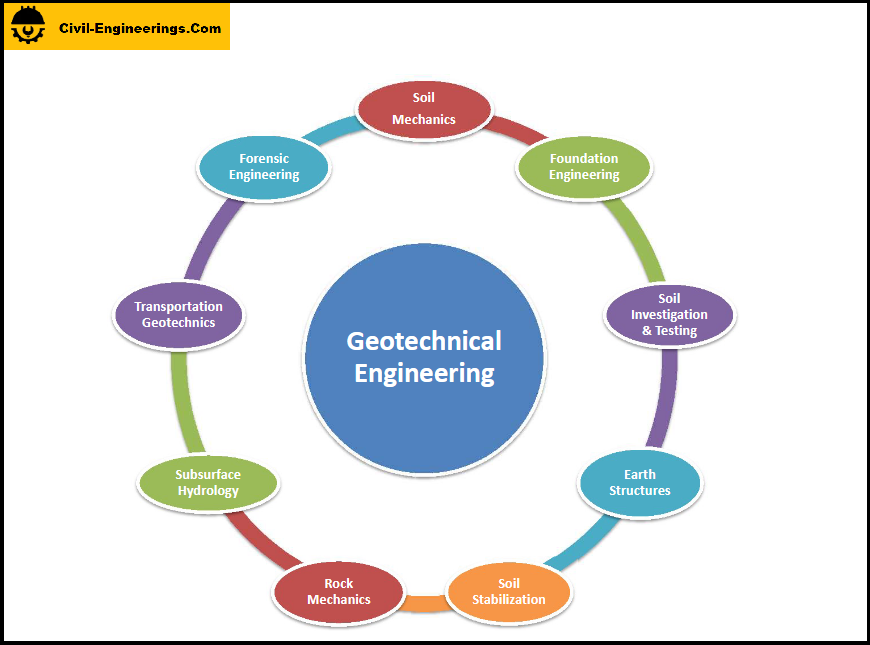The Definitive Guide for Specialized Geotechnical Engineering Solutions
Table of ContentsSome Ideas on Specialized Geotechnical Engineering Solutions You Need To KnowMore About Specialized Geotechnical Engineering SolutionsFacts About Specialized Geotechnical Engineering Solutions Uncovered9 Simple Techniques For Specialized Geotechnical Engineering Solutions
They carry out website investigations, gather examples, execute laboratory tests, and assess data to evaluate the viability of the ground for construction projects. Based upon their findings, geotechnical engineers offer suggestions for foundation design, incline security, preserving frameworks, and reduction of geotechnical dangers. They work together with other experts, such as designers, structural engineers, and construction groups, to make sure that geotechnical factors to consider are integrated into the overall task style and application.
Structure Style: Geotechnical engineers play a vital function in designing foundations that can securely sustain the designated structure. They assess the dirt problems and load requirements to determine the ideal structure type, such as shallow structures (e.g., footings), deep foundations (e.g., heaps), or specialized methods like soil renovation. They take into consideration aspects such as settlement restrictions, birthing capacity, and soil-structure communication to establish optimal structure styles.
The 10-Minute Rule for Specialized Geotechnical Engineering Solutions
Below are some kinds of geotechnical engineers: Structure Engineer: Foundation designers specialize in creating and assessing foundations for frameworks - Specialized Geotechnical Engineering Solutions. They analyze the soil conditions, lots requirements, and site attributes to determine the most proper foundation kind and layout, such as shallow foundations, deep foundations, or specialized strategies like heap foundations
They carry out area screening, accumulate samples, and evaluate the gathered information to identify the dirt homes, geologic developments, and groundwater problems at a website. Geotechnical Instrumentation Engineer: Geotechnical instrumentation engineers concentrate on tracking and gauging the actions of dirt, rock, and frameworks. They mount and maintain instrumentation systems that keep track of elements such as soil settlement, groundwater levels, slope motions, and structural displacements to examine performance and supply early warnings of prospective problems.
In the office environment, geotechnical engineers utilize specialized software tools to perform calculations, create layouts, and assess information. Specialized Geotechnical Engineering Solutions. They prepare records, evaluation job specs, interact with clients and team participants, and coordinate task tasks. The office setting provides a helpful setting for research study, analysis, and collaboration with other specialists entailed in the job
They frequently visit task websites to carry out site examinations, examine geotechnical conditions, and gather information for analysis. These gos to involve taking a trip to different locations, occasionally in remote or difficult terrains. Geotechnical designers might carry out dirt tasting, conduct examinations, and display construction tasks to make sure that the geotechnical aspects of the task are being carried out correctly.
Specialized Geotechnical Engineering Solutions Fundamentals Explained
Geotechnical engineers additionally work in specialized geotechnical labs. In these centers, they conduct experiments, carry out examinations on dirt and rock samples, and examine the engineering buildings of the materials. Geotechnical lab designers function extensively in these atmospheres, managing screening equipment, operating instruments, and taping information. They collaborate with other lab team to make certain accurate and reputable screening outcomes.
Retaining Walls: Creating walls that hold back dirt to stop landslides and provide stability on sloped terrains. Embankments and Earthworks: Designing embankments for roadways, trains, and dams to guarantee they continue to be steady under stress and anxiety. The mining market counts heavily on geotechnical engineering to ensure the safety and longevity of its procedures.
With more tips here this in mind, we have actually created our program to prepare pupils for success. Geotechnical engineers are entailed in all stages of the layout of structures, from principle to building. Their job is essential in the style and planning process as they assess the stability of dirt, clay, silt, sand, and rock, prior to building starting.
How Specialized Geotechnical Engineering Solutions can Save You Time, Stress, and Money.
This is adhered to by a ground investigation based on the findings of the workdesk research and entails test matching and tasting to discover any type of prospective problems. Geotechnical engineers work within multidisciplinary teams, sustained by intermediate and younger engineers in addition to by CAD service technicians. As a senior geotechnical engineer on a hydro plant project, jobs might consist of taking part in technical reviews (e.g., peer reviews), tailings clog examinations, dam safety and security evaluations, and other studies connected to the layout and building and construction of mine waste facilities.
While some professionals specialise only in geotechnics, others might work under titles like design rock hound or ground engineer within comparable abilities. As a geotechnical engineer, you'll need to: construct and preserve relationships with customers and other professionals associated with the website, throughout each projectmaintain safety criteria on website be mindful of price ramifications when you make recommendationsstudy geological maps and aerial pictures from a series of resources and from various time periodsexamine construction intends to see exactly how viable they are based on your understanding of the siteinvestigate risks or geological dangers for the sitesearch for environmentally delicate functions, such as land fill begin to create accurate and expository ground modelsplan field investigationsdrill and evaluate samples of bedrock, dirt, groundwater and added materials supervise other specialists on sitesolve technical concerns as they occur, such as unanticipated structures at drill sitesmonitor conditions throughout and after construction to make certain frameworks are secure in the brief and long termadd information collected on website to your preliminary researchcreate geotechnical calculations, drawings, and two or three-dimensional computer versions translating the datamake referrals about navigate to this website the suggested use of the website.
There are great deals of chances to fulfill new people, as you'll function with a series of experts at every website. The work can be stressful as you might be liable for the safety of others while on site. There is additionally a high degree of financial obligation, as the suggestions you make can have significant cost ramifications.
